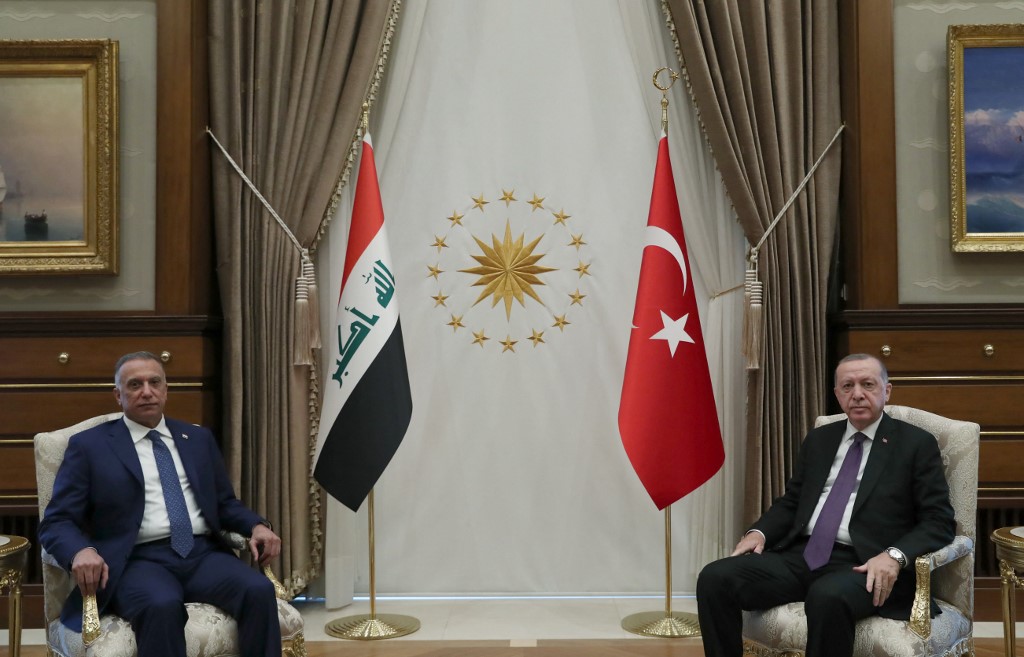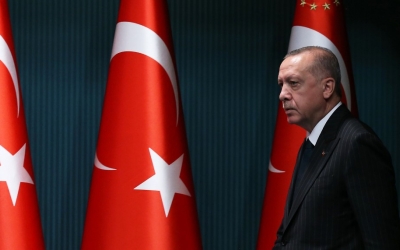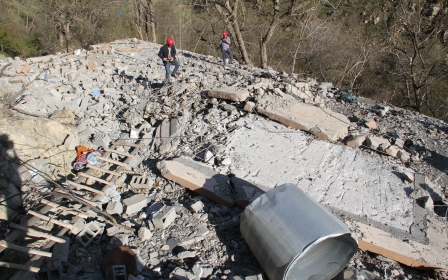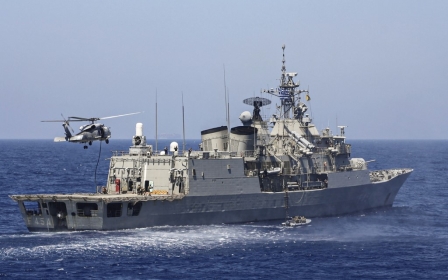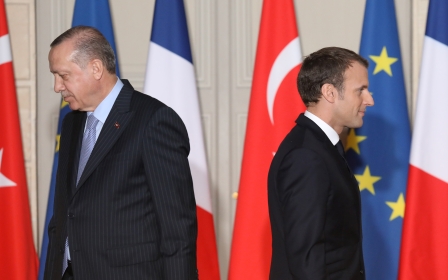In Iraq, Turkey faces a tough road ahead with an array of enemies
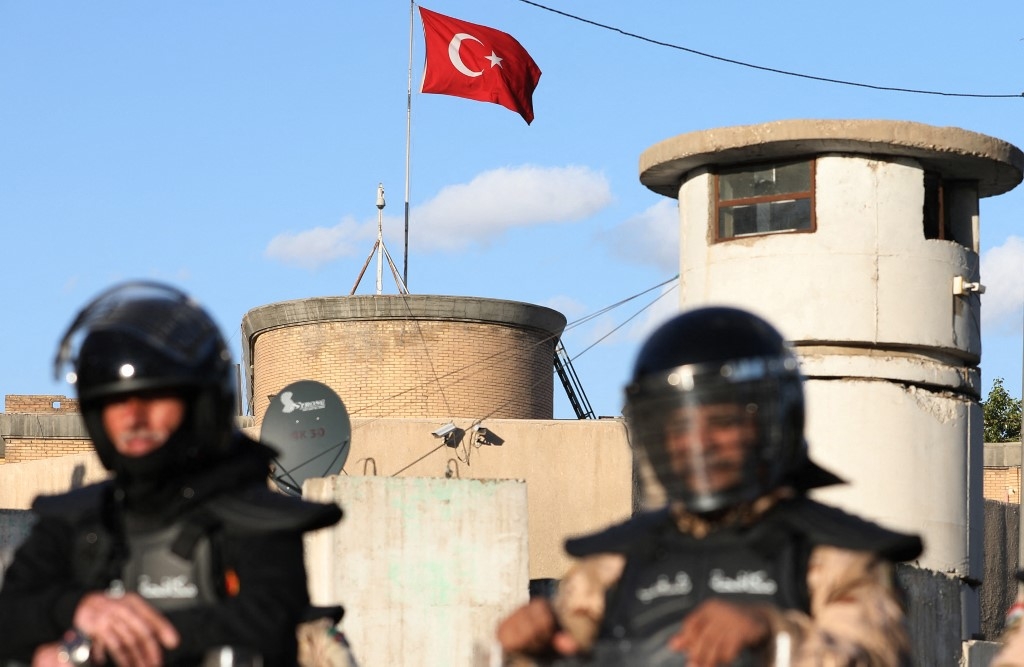
An array of countries sharing hostility towards Turkey - France, Greece, the UAE, Saudi Arabia, and Armenia - have gradually stepped up their diplomatic and economic presence on Turkey’s southern frontier in Iraq’s Kurdish region.
Simultaneously, Iraqi paramilitary actors of the Iran-led regional "axis of resistance" are growing more hostile towards Turkey, as the latter sees a growing threat from the Kurdistan Workers’ Party (PKK) in Yazidi-inhabited Sinjar in the north of Iraq.
The Euro-Arab bloc and Iran-allied paramilitaries are far from being in a marriage of convenience against Ankara in Iraq, but this two-fronted battle will pose a difficult challenge for Turkey in 2021. Each country is concerned about Turkish power projection in their respective neighbourhood or region of interest, and they increasingly find in Turkey’s unresolved Kurdish question a solid venue for spoiling activity.
Diplomatic overtures
The influence of some of Turkey’s rivals in Iraq is not novel. France has had a longstanding interest in Iraq, paying special attention to its Christian and other minorities. But since last year, France has made a number of notable diplomatic overtures to Iraq, with high-profile visits in July, August and September as tensions soared in the Eastern Mediterranean between Turkey and Greece over natural resource exploration. They also coincided with an intensified Turkish military campaign against the PKK in Iraq.
Another longstanding player in Iraq is the UAE, which possesses significant economic clout in the Kurdish region. The UAE and Saudi Arabia have been supporting the PKK-linked Syrian Democratic Forces in northeastern Syria for years, while a report last June asserted that Abu Dhabi was supporting the PKK in Iraq.
This growing European courting of Erbil and Baghdad ultimately aims to augment their bargaining power against Ankara
France and the UAE were likely the driving force that prompted Greece and Armenia to engage Baghdad and Erbil diplomatically. This heightened European engagement with Iraq followed a May 2020 joint declaration from France, the UAE, Greece, Cyprus and Egypt, targeting Turkey over tensions in the Eastern Mediterranean.
Athens followed the lead of Paris by arranging a visit to Baghdad by Foreign Minister Nikos Dendias last October. Since then, Greece has been using strong language against Turkey’s increasing cross-border military operations against the PKK in Iraq.
Armenia joined this concerted diplomatic effort in Iraq after Ankara helped Baku defeat Yerevan in the 2020 round of the Nagorno-Karabakh conflict. Soon afterwards, Armenia inaugurated a consulate in Erbil. This growing European courting of Erbil and Baghdad ultimately aims to augment their bargaining power against Ankara.
Military incursion
At the same time, Turkish ambitions to cut off the PKK’s network across Iraq and Syria have been strongly challenged by powerful Iran-allied Iraqi paramilitaries. They are concerned that the Turkish sealing of the northern section of the Iraq-Syria border will reduce the burgeoning Iran-Eastern Mediterranean land bridge.
The US has attempted to seal southern areas of the Iraq-Syria border in the face of those paramilitaries.
In recent weeks, as Turkey was reportedly preparing an imminent military incursion into Sinjar to counter the PKK, Iraqi paramilitaries sent ultimatums to Turkey and, more importantly, reinforcements into Sinjar. Ashab al-Kahf, a Shia militant group that gained prominence early last year, claimed on 15 February to have fired a rocket at a Turkish military post in the north of Iraq.
This does not mean that Iran has no interest in fighting the PKK alongside Turkey. The PKK has repeatedly disrupted the Iran-Turkey gas pipeline, going against Iranian economic interests. But Iran likely has a compartmentalised approach to the PKK, wherein it fights associated groups that threaten its borders, while tolerating such groups in more distant areas when needed against the Islamic State and as an annoyance to Turkey.
This foray of charm offensives and hard security threats posed against Turkish interests will not all bear fruit equally.
Firstly, support to PKK-affiliated groups from Iraqi paramilitaries and regional actors contributes to Turkey being bogged down in conflicts in its immediate neighbourhood, slowing its overseas power projection, or so its rivals hope.
Secondly, limited European courting of Erbil is unlikely to translate in the short-term into weaker security cooperation between Ankara and Erbil against the PKK. While Erbil has a history of providing occasional leeway to the PKK as leverage against Ankara, this is unlikely to be the case in the foreseeable future.
The PKK’s resilience and Iraqi paramilitary rocket attacks on Erbil drive the latter towards Ankara further.
Zone of influence
Turkish-Iraqi trade has been growing, and Ankara recently started exporting electricity to Iraq - yet Turkey is losing other economic opportunities, especially in the north of Iraq, thanks to France and the UAE’s charm offensive. Early this year, Turkish contractors lost out to French competitors in a bid to renovate the Mosul International Airport. Turkey had long eyed the project, perceiving the city as within its natural zone of influence.
At the same time, UAE gas companies operating in the Kurdish region have long subscribed to a local consumption-oriented vision, instead of an export-oriented one, while not rejecting the latter. Ankara, on the other hand, would like to prioritise gas development in Iraq for export to Europe, a project that has not yet materialised for market and geopolitical reasons.
To lobby for its interests in Iraq’s domestic political arena, Turkey faces the challenge of having its political allies reorganise themselves for the upcoming parliamentary elections. Several of Ankara’s allies are ageing and losing power in the face of younger Iraqi politicians close to Abu Dhabi and Riyadh. Thus, raising a new, younger class of allied politicians is likely a medium-term goal.
Turkey’s long-term security approach to the PKK is to indoctrinate neighbouring populations with an anti-PKK attitude, to relieve Ankara from fighting the group abroad on its own.
A notable aspect of Turkey short-term security approach is ingraining the NATO mission in Iraq with an anti-PKK theme. As the number of Nato personnel in Iraq expands, Turkey will likely lobby to expand its presence in the mission.
But even if Turkey does not intend to use its participation in the Nato mission in Iraq to send a hostile message to Iran’s regional axis, an expanded participation will surely increase frictions between Turkey and Iran.
The views expressed in this article belong to the author and do not necessarily reflect the editorial policy of Middle East Eye.
Middle East Eye propose une couverture et une analyse indépendantes et incomparables du Moyen-Orient, de l’Afrique du Nord et d’autres régions du monde. Pour en savoir plus sur la reprise de ce contenu et les frais qui s’appliquent, veuillez remplir ce formulaire [en anglais]. Pour en savoir plus sur MEE, cliquez ici [en anglais].



